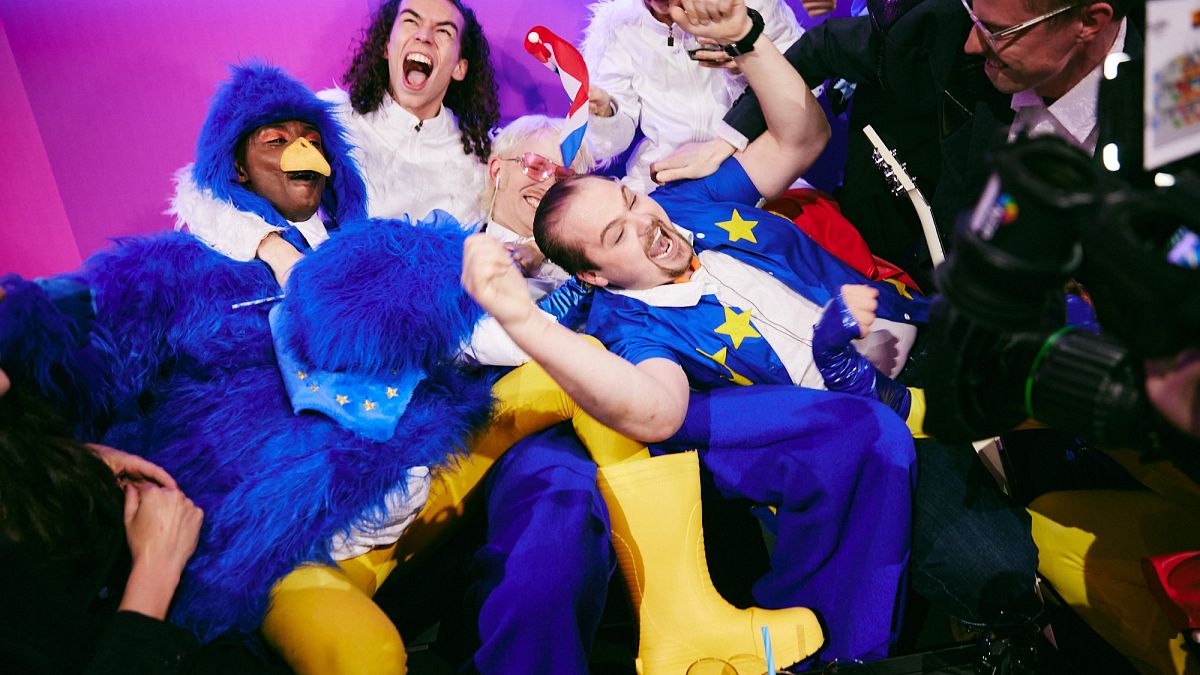“We love music. That’s what I can say,” said a Commission spokesperson trying to dodge a question earlier this week on whether the EU executive has a personal favourite for the final.
Even if the Commission hasn’t taken a stand, the competition entries – which were watched by more than 162 million of people last year – appear to be nodding increasingly towards Brussels, with some songs even referring more or less explicitly to the EU.
This is the clearly the case of 'Europapa' brought on the stage by the Dutch singer Joost Klein – an evidently pro-European song that has already won the hearts of many EU enthusiasts.
In his ode to Europe’s integration, Klein praises the freedom of movement enabling him to visit his friend in France or take a long walk to Vienna without a passport.
There’s much more about EU policies than this reference to the Schengen system in this year’s Eurovision, though. Here are the Euronews EU policy team’s very own interpretations of the songs you’ll be listening to on Saturday.
The EU’s rural strategy
Since the start of the Eurovision week, Croatia’s entry 'Rim Tim Tagi Dim' by Baby Lasagna has been a favourite of the bookies who anticipate an easy win for him in the grand finale.
Despite a danceable tune, the song lyrics tell the sad story of a youngster compelled to leave his home in a rural community to seek his fortune in the city.
“I’m a big boy now/I’m going away and sold my cow,” sings Baby the Croatian, who comes from a remote coastal area.
The phenomenon of rural depopulation is a repeated issue for the Commission, which attempted to tackle and reverse it in 2021 launching its long-term vision for the EU’s rural areas that proposed a rural pact and a rural action plan.
Presenting the rural action plan, Commission vice-president Dubravka Šuica – also from Croatia – said that “rural areas are often forgotten but are the beating heart of our societies.”
Hard on drugs, easy on alcohol: EU policy on risk factors
Estonia’s entry has been already nicknamed “The Drug Song” by fans: its content lists some of the main risk factors of non-communicable diseases (NCDs) – for which the EU has a specific strategy.
In some of the verses, the Estonian 5MIINUUST x Puuluup seem to be on a similar page to the European institutions: strongly condemning use of drugs, while sounding a little more emollient on use of alcohol: “I don’t know drugs I know soda and cider/I wouldn’t tell the difference between vitamin and speed.”
“We avoid drugs just because we’re not rich/In the backroom of our farm there are only IPAs on the table,” the song continues.
The World Health Organisation (WHO) has criticised the EU for this lax approach to alcohol, and Estonia's entry seems unlikely to help with the cause.
Mental Health
Mental health is another big topic in music – as well as for EU policy.
“Don’t look now/Oh you’ll see me crying rivers I might drown” and “I don’t wanna lose me so cruelly/I’m drifting in and out of who I am” are only some of the many references Latvian singer Dons make to mental health issues such as depression in his song Hollow.
The lyrics present a deep emotional view on his insecurities, inner demons and feelings. Another bookie’s favourite, Italy’s Angelina Mango laments ennui redolent of the COVID-era: “I die without dying/In these worn-out days/I live without suffering/ no bigger cross”.
It is estimated that around 84 million people in the EU were affected by mental health problems before the COVID pandemic with almost half of the bloc’s population having experienced psychosocial problems.
While discussion of mental health has been a taboo for many years the EU’s strategy aims to normalise talking about these problems and for it to stop being a so-called “silent pandemic”.
Climate Change and ocean policy
Eurovision is hosted this year by Sweden, home of climate activist Greta Thunberg. In her most famous speech in Davos, at the 2019 World Economic Forum, she used a powerful analogy to describe the climate crisis saying that “our house is on fire".
We can see glimpses of this metaphor in ‘Firefighter’, Georgia’s entry this year sung by Nutsa Buzaldze. “The ceiling is falling, the windows are burning/It’s getting harder to breathe,” the lyrics read, inviting the firefighter of the title to "put out the fire".
The bloc’s environmental policies appear to strike a chord with France’s act too, as Slimane promises to create “an ocean in the fire”.
Though ostensibly about the pain of unrequited love – an all-too-familiar staple of Eurovision – is this a plea about the impact of rising global temperatures on marine life?
If there’s a connection between the French singer-songwriter and staffers from the European Commission’s maritime affairs department DG MARE, we're not aware of it.


